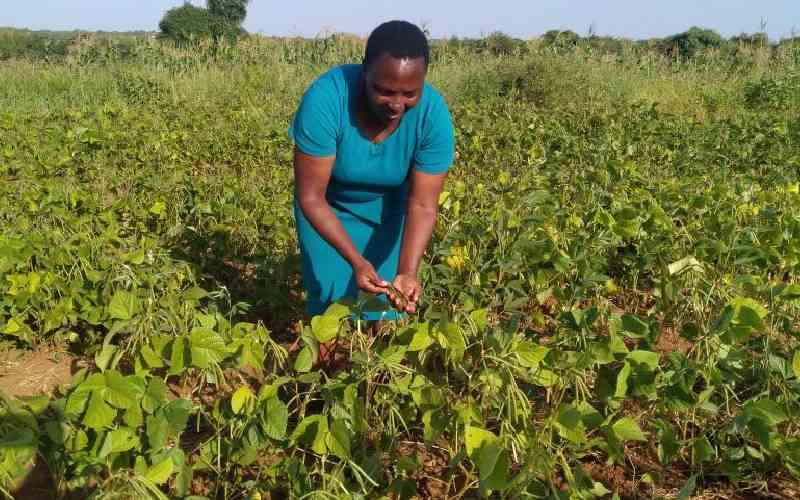A ravaging drought has hit a major lake in Lamu County with vengeance, raising concerns among residents and conservationists.
Conservationists say more than 20 hippopotami have died after Lake Kenyatta in Mpeketoni dried for the first time in the history of the settlement established in the early 1970s.
The lake usually hosts about 200 hippos, but they have now moved from the drying up water body to the forest, following the harsh environment.
Fishermen stare at the blue skies every morning as they have lost traditional fishing ground whose shores are now littered with skeletons of the water beasts.
Lake Kenyatta supports agriculture in the settlement of about 50,000 people, but its drying up has spelt doom to humans and animals alike.
A nauseating smell strikes nostrils from as far as 100m away as one approaches the water source. A flock of birds wade the muddy waters and forage for food.
Carcasses
The double-crested cormorant, the canvasback, the black skimmer and the heron compete for water life. Vultures and marabou storks also scavenge on the carcasses. Thousands of snail and molluscs as well as a number of tortoise shells litter the shoreline like a war aftermath.
A bloat of hippopotami, which used to lie still in the muddy waters during the day with their heads and backs scorched in the unforgiving sun, has gradually disappeared. Fishermen who used to complete for small fish caught from the mud have hanged their nets as there is no more catch.
Lake Kenyatta has shrunk fast, owing to rain failure in the past two years and continued human interference with the environment. Farmers have blocked the two streams feeding the lake, resulting in heavy silting.
In the 1980s, the lake acted as a major attraction to nature lovers owing to its abundant animals. It was estimated to have covered a stretch of 3.7 square kilometres, but it has now turned into mere mud.
“Life is tough here for everyone – humans and animals. The lake has dried up and there is no more catch. The hippos have died in large numbers. They have been dying since September last year,” says Moses Kaingu, an artisanal fisherman and Mpeketoni resident.
A fish monger Tabitha Wanjiru says, she could not understand why the lake dried up at a faster pace since last year and hippos died in big numbers.
“By this time last year, the water mark was at that watch tower now located more than 100m away. I cannot tell what is happening to the lake,” Wanjiru says, pointing to the tower behind open sandy fields that resemble a football pitch in what used to be part of the lake bed.
Stay informed. Subscribe to our newsletter
The fish folk say the nearby smaller lakes such as Kangawati, Munuji and Amu have also dried up and humans and animals are flocking to Lake Kenyatta that supports Mpeketoni settlement and its environs.
Lake Kenyatta, which is named after founding President Jomo Kenyatta, is located about 2.5km from Mpeketoni town and approximately 50km from the Lamu County headquarters.
Apart from the pod of hippopotami, the lake also supports herds of zebras, water bucks, buffaloes, warthogs and monkeys, as well as flocks of birds. It has recently hosted huge herds of cattle from as far as Garissa and Tana River counties that have invaded Lamu County for pasture.
However, due to encroachment by the rapidly growing population in the Mpeketoni settlement and poor rainfall, the lake is shrinking fast and raising fears to users, leaders and conservationists.
Farmers have invaded wetlands and there has been heavy drilling of many boreholes in the catchment area to support small-scale irrigation activities, leading to siltation among other problems.
Lake Kenyatta Beach Management Unit (BMU) secretary Duncan Odhiambo says he has witnessed the lake dry up for the first time in the 22 years he has been a fisherman.
“We are staring at a disaster as residents. This lake is our livelihood but it has dried up. There will be no single drop by end of March if it does not rain. We used to cross the lake by boat but we can now wade through the mud,” says the distraught fisherman.
He observes that life has been turned upside down for humans and animals as the water has become saline.
“Bones have littered around the lake. Hippos have died because there is no water and pasture,” Odhiambo says.
The BMU has 150 members, who mainly rely on the lake for livelihood, as they used to supply fresh fish to Mpeketoni town and smoked ones to Malindi, Mombasa and other coastal towns.
Coastal Kenya programme manager for Worldwide Fund For Nature (WWF), John Bett, says farmers invaded the wetlands that feed the lake, interfering with the water flow into it.
Bett explains that a big population depends on the lake for survival from Mpeketoni to Mkunumbi among others areas, but little is being done to conserve the resource.
“Each year, over four million head of cattle drink water from the lake, which makes it the most reliable lake in the county,” says Bett.
He suggests that the short-term measure is to fence off the lake to reduce the influx of cattle that worsens the siltation problem. He also wants the Kenya Wildlife Service (KWS) to gazette the area to address water insecurity.
Environmental challenges
Benson Kariuki, chairman of the Lake Kenyatta Water Users Association, says they have had environmental challenges in the last eight years regarding the lake.
Mr Kariuki says after the El-Nino rains, the lake’s water levels rose to 12 metres, but the levels have now fallen drastically to an alarming rate.
“Water turned salty and hippos can no longer be sustained in the lake, even fish have a problem. We urge the national and county governments to intervene and demarcate the lake for its protection,” Kariuki says.
The association runs a Sh80 million project funded by Coast Water Services Board to supply water to over 5,000 residents.
Kariuki says the lake used to have a depth of about four metres where hippos could live comfortably.
Lamu Governor Issa Timamy says Lake Kenyatta will completely dry up in a matter of weeks, worsening the water crisis being experienced in the entire county after a number of lakes, wells and rivers dried up.
Timamy says some wells near Lake Kenyatta and Witu as well as Lake Pangani and River Mangai have dried up, despite being permanent sources of water for residents over the years.
 The Standard Group Plc is a
multi-media organization with investments in media platforms spanning newspaper
print operations, television, radio broadcasting, digital and online services. The
Standard Group is recognized as a leading multi-media house in Kenya with a key
influence in matters of national and international interest.
The Standard Group Plc is a
multi-media organization with investments in media platforms spanning newspaper
print operations, television, radio broadcasting, digital and online services. The
Standard Group is recognized as a leading multi-media house in Kenya with a key
influence in matters of national and international interest.
 The Standard Group Plc is a
multi-media organization with investments in media platforms spanning newspaper
print operations, television, radio broadcasting, digital and online services. The
Standard Group is recognized as a leading multi-media house in Kenya with a key
influence in matters of national and international interest.
The Standard Group Plc is a
multi-media organization with investments in media platforms spanning newspaper
print operations, television, radio broadcasting, digital and online services. The
Standard Group is recognized as a leading multi-media house in Kenya with a key
influence in matters of national and international interest.








